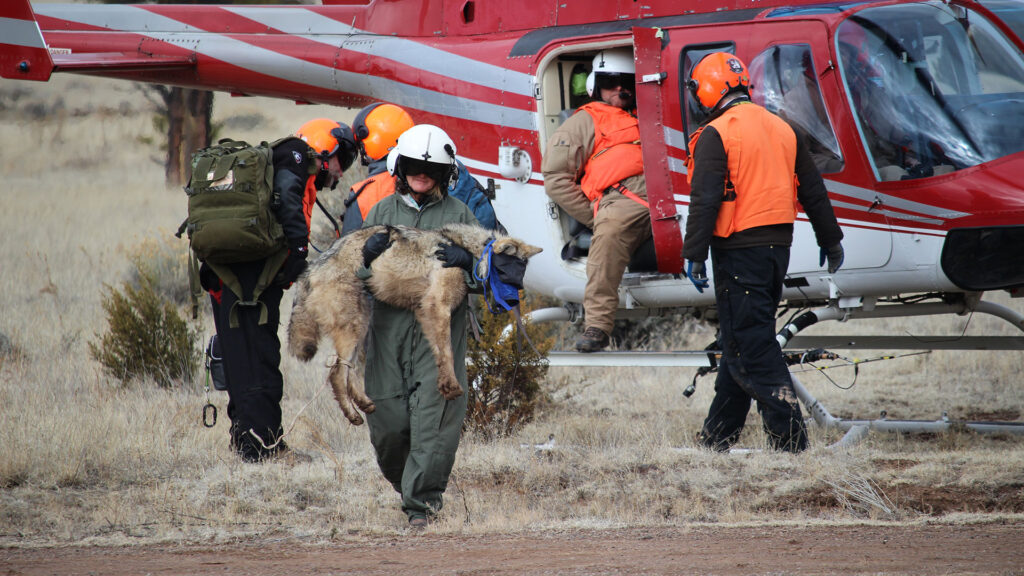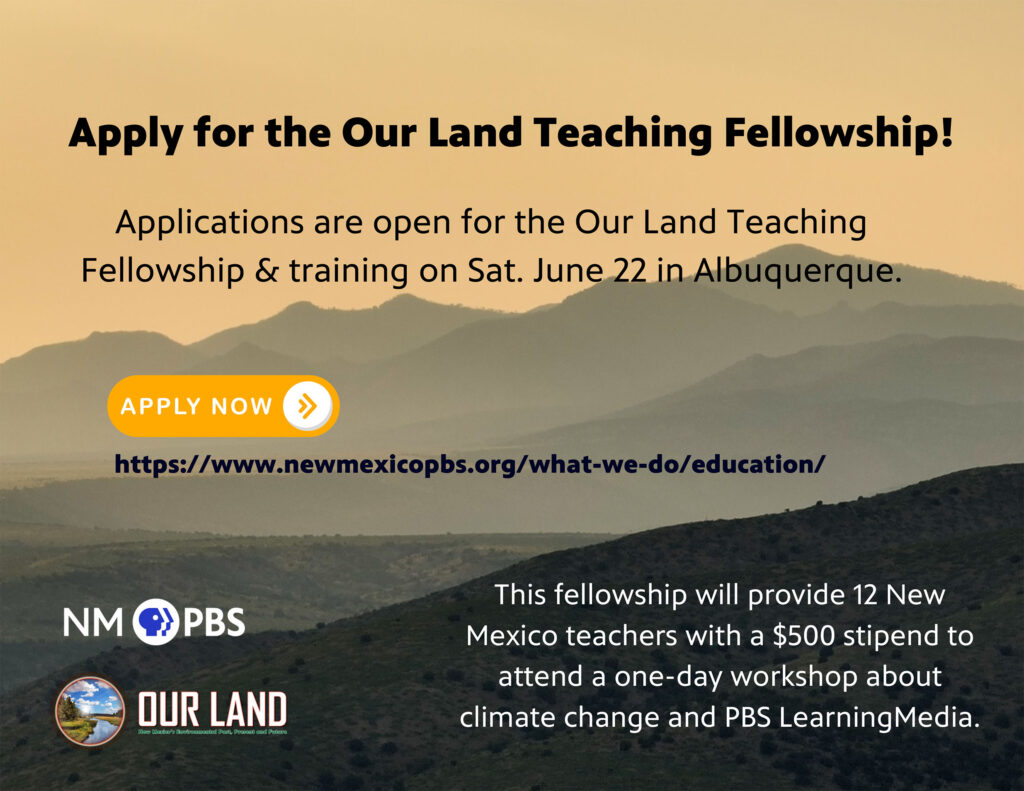The heart’s ballast

Coming up this week, we’ll be airing a segment on Mexican wolves and how many are currently living in the wild in New Mexico and Arizona. Tune in for that—and get a sneak peak on YouTube.
Over the past three years, NMPBS has aligned science and social studies lesson plans for middle school students with environmental content from Our Land. Now, we’re inviting teachers to apply for the Our Land Teaching Fellowship and training event on Saturday, June 22 in Albuquerque.
The fellowship will provide 12 New Mexico teachers with a $500 stipend to attend a one-day workshop about climate change, PBS LearningMedia, and Our Land—and a session on the co-creation of new lesson plans most relevant and interesting to New Mexico’s middle school students.
The fellowship will also include opportunities for additional activities and resources—and lay the groundwork for a cohort of leaders who are working with students on issues around climate change in New Mexico.
This isn’t a Public Education Department or Albuquerque Public Schools required training, nor a training during which teachers will sit inside all day, listening to presentations or watching videos. There will be hands-on activities and opportunities for small group conversations. In addition, we want to learn from you (and from what you learn from your students), energize your new school year, and build relationships with teachers and students around the state.
The deadline to apply is April 10, so visit our education page to do that!

A look at some of the news:
• “Northern NM fire victims will be spared additional taxes under provision approved by Legislature” (Patrick Lohmann, Source New Mexico)
• “New Mexico issues $420,000 in fines over improper waste storage at LANL” (Scott Wyland, Santa Fe New Mexican)
• “Officials seek best way to tackle ‘forever chemicals’ in communities near Santa Fe” (Scott Wyland, Carina Julig, and Maya Hilty, Santa Fe New Mexican)
• “Household wells likely contaminated for decades lead to costs, concerns” (Carina Julig, Santa Fe New Mexican)
• “A new watchdog satellite will sniff out methane emissions from space” (Nicolás Rivero, The Washington Post)
• “West Texas orphan wells are leaking with unknown harms” (Carlos Nogueras Ramos and Martha Pskowski, The Texas Tribune and Inside Climate News)
If you haven’t been watching the news from Texas, it’s pretty nuts. As of Monday, wildfires in the Texas Panhandle had already burned 1.3 million acres. The largest, the Smokehouse Creek Fire, ignited last Monday—and by Wednesday afternoon had already burned more than a half-million acres. And as Emily Foxhall reports, climate change is extending Texas’s winter wildfire season.
Next week, officials from New Mexico State Forestry will be coming into the studio to talk about what to expect in New Mexico this fire season. Just a reminder that you can always be thinking about how to protect yourself and your community (and the firefighters who try to protect your community). A good place to find fire prevention and preparedness information is on the state’s website.
And of course, it’s not just the United States where wildfires are becoming more “exceptional.” Canada is preparing for an even worse season than last year in two of its provinces, “where nearly 150 of the blazes that started during last year’s season are still burning this winter, under snow-covered ground,” according to Ian Austen’s story in The New York Times.
There are a couple of events this week that readers might be interested in:
• Dr. Bob Wilson, associate professor of geography at Syracuse University will be speaking on Friday, March 8 at 3 p.m. at UNM’s Mitchell Hall (Room 102). His talk is “Sandia: A Mountain, A Family, and the Climate Crisis.”
• “Looking to the Mountain: Sacred Lands, Healing Cultures” is happening on Friday, too, at the ABQ BioPark as part of the Ancestral Gila Homeland Events, celebrating the 100th anniversary of the Leopold Wilderness.
Lastly, in case you haven’t noticed, I try to balance staying informed about the serious things happening to our Earth with the undeniable sense of joy I feel about everything from migrating birds to astonishing sunsets. I invite you to do the same, if you can step outside today.
NMPBS is in the heart of Albuquerque, but a cool array of wildlife puts up with our concrete, traffic, trash, noise, and general human obnoxiousness to live all around the city. Around the station there are roadrunners, rabbits, coyotes, raptors, and tons of other birds, including great horned owls, pigeons, house finches, and house sparrows.
On Monday morning, as I came into work, there were the remains of two rabbits—and some coyote scat—right in front of the station. Walking across the street for lunch, I was closely monitored by two roadrunners and saw my first real wildflowers of spring, a small spectacle pod catching up with the waking bees and blooming out of the hard-packed dirt alongside the driveway. All that reminded me of a line I recently read in a Jane Hirschfield poem: “The feeling heart does not tire of carrying ballast.”
It’s hard to keep paying attention to the world’s changes and challenges. But by caring for the life happening all around us, every day, it’s possible to feel connected, stay grounded, and keep working toward a better future.
P.S. If a friend forwarded you this message, sign up here to receive the newsletter yourself. You can also read recent newsletters online. And if you miss us throughout the week, follow Our Land on Instagram.


